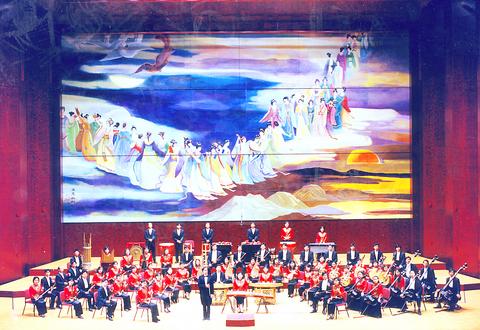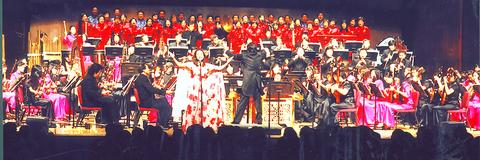The Taipei Traditional Arts Festival (TTAF, 台北傳統藝術季) is once again set to bring a mixed bag of dance, theater, opera and music to Taipei over the following months, when the Taipei City Government and the Taipei Chinese Orchestra (TCO, 台北市立國樂團) sponsored event kicks off with a recital of Tang and Sung Dynasty poetry this weekend at the Chungshan Hall (中山堂).
At a pre-festival reception earlier last week, Taipei mayor, Ma Ying-Jeou (

PHOTO: LEE MING-HSUN
"The [Taipei Traditional Arts Festival] is an important part of the city's on-going plans to develop Taipei as a cultural city offering both locals and tourists alike the opportunity to discover the city's cultural heritage," said the mayor.

PHOTO COURTESY OF THE TCO
Although the festival, funding for which is provided by the City Government, was first held in 1989, the concept for the event was based on an idea put forward by ex-President, Lee Teng-hui (李登輝), during his tenure as Taipei mayor.
According to current Chungshan Hall and TCO director, Wang Cheng-ping (
"Being the first fully professional Chinese classical orchestra in Taiwan at the time it was felt that it was the only organization with the resources to organize such an event," explained Wang.
Founded in 1979, the TCO, or the Taipei Municipal Chinese Classical Orchestra, as it was known until last year, was, and still is, one of Taiwan's leading promoters of various forms of Chinese classical music. The orchestra holds numerous performances both in and outside of Taipei and organizes music education and appreciation classes at both schools and community centers citywide.
Based out if the Taipei Municipal Social Education Hall (
Much like the political opinions of the festival's founding father, a lot has changed within the TTAF since 1989. Once solely a platform for Taiwan's classical music, dance and opera entertainers, the event now sees opera troupes and musical ensembles from China as well as Europe and the Americas invited to take part.
"We've certainly branched out quite a bit. And while the event has continued to focus on various regional forms of traditional Chinese music, poetry and opera, we have taken the opportunity to invite non-Chinese orchestras and individuals to perform with us," said Wang.
While Western orchestras have been invited to take part in the past, this year's special guests all hail from China, a move that, according to Wang, was made in order to avoid the lengthy and costly process of amalgamating Western and Oriental ensembles and writing special scores.
"The budget dictates what we can and can't include in the festival. Obviously it is never going to be enough so we have to simply make do with what we are given," continued Wang. "There are numerous performers in China and Europe who we would love to invite, but it's impossible.
"The inviting of non-traditional Chinese acts also leads to costly problems, especially when you have to commission a special score."
According to Wang, criticism that has been leveled at organizers for focusing on China rather than Taiwan is unwarranted. "The festival is not simply a celebration of Han culture but of all Taiwan's and China's many diverse and contrasting cultures and traditional arts," he said.
Although ticket sales for both classical concerts and more contemporary shows have fallen to an all-time low over the past three years, the festival enjoys average ticket sales of roughly 70 percent. This, according to Wang, proves that while large numbers of Taiwan's youth are now converts to electornica, sport garish late 1970s new-wave hairdos and are more knowledgeable about albums by Linkin Park than the groundbreaking works of late classical musicologist Liang Tsai-ping (
"You'd be surprised at how many young people actually come to the concerts. Most schools have classical orchestras and classical Chinese music education is part of many school curriculums," continued Wang.
This year's special guests include the Tienjin Chinese Orchestra (天津民族樂團), which will be teaming up with the TCO for a special concert which will see the two ensembles performing a selection of tunes old and new.
The Inner Mongolian Acrobatic Troupe (內蒙古雜技團) will be putting its spin on proceedings and adding a different angle to events, when it brings both gymnastic and archery displays to the plaza in front of the Chungshan Hall.
One of the most anticipated aspects of this year's festival is the Taipei Hu-chin Festival (
As in previous years the program is designed to suit audiences of all ages and all musical tastes. With performances such as the Black Dragon Cave (
Tickets for performances in the 2003 Taipei Traditional Arts Festival range in price from NT$200 to NT$1,800 depending on performance and are available from ERA ticketing or directly from the Chungshan Hall box office. For further ticketing information and a full program of events, check the festival Web site at http://www.csh.taipei.gov.tw.

June 2 to June 8 Taiwan’s woodcutters believe that if they see even one speck of red in their cooked rice, no matter how small, an accident is going to happen. Peng Chin-tian (彭錦田) swears that this has proven to be true at every stop during his decades-long career in the logging industry. Along with mining, timber harvesting was once considered the most dangerous profession in Taiwan. Not only were mishaps common during all stages of processing, it was difficult to transport the injured to get medical treatment. Many died during the arduous journey. Peng recounts some of his accidents in

“Why does Taiwan identity decline?”a group of researchers lead by University of Nevada political scientist Austin Wang (王宏恩) asked in a recent paper. After all, it is not difficult to explain the rise in Taiwanese identity after the early 1990s. But no model predicted its decline during the 2016-2018 period, they say. After testing various alternative explanations, Wang et al argue that the fall-off in Taiwanese identity during that period is related to voter hedging based on the performance of the Democratic Progressive Party (DPP). Since the DPP is perceived as the guardian of Taiwan identity, when it performs well,

The Taiwan People’s Party (TPP) on May 18 held a rally in Taichung to mark the anniversary of President William Lai’s (賴清德) inauguration on May 20. The title of the rally could be loosely translated to “May 18 recall fraudulent goods” (518退貨ㄌㄨㄚˋ!). Unlike in English, where the terms are the same, “recall” (退貨) in this context refers to product recalls due to damaged, defective or fraudulent merchandise, not the political recalls (罷免) currently dominating the headlines. I attended the rally to determine if the impression was correct that the TPP under party Chairman Huang Kuo-Chang (黃國昌) had little of a

A short walk beneath the dense Amazon canopy, the forest abruptly opens up. Fallen logs are rotting, the trees grow sparser and the temperature rises in places sunlight hits the ground. This is what 24 years of severe drought looks like in the world’s largest rainforest. But this patch of degraded forest, about the size of a soccer field, is a scientific experiment. Launched in 2000 by Brazilian and British scientists, Esecaflor — short for “Forest Drought Study Project” in Portuguese — set out to simulate a future in which the changing climate could deplete the Amazon of rainfall. It is